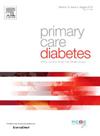应用糖尿病风险评分对初级保健生活方式咨询和共同决策的影响:一项实用的集群随机试验。
IF 2.6
4区 医学
Q3 ENDOCRINOLOGY & METABOLISM
引用次数: 0
摘要
目的:目前缺乏糖尿病风险评分对糖尿病预防影响的研究。本研究的目的是调查应用非侵入性糖尿病风险评分作为常规健康检查的组成部分对初级保健咨询强度和共同决策(SDM)的影响。方法:聚类随机试验,初级保健医生(n = 30)入组参与者(n = 315),有法定健康保险,已知无糖尿病,年龄≥ 35岁,体重指数(BMI)≥ 27.0 kg/m2。在干预组,德国糖尿病风险评分(GDRS)作为标准常规健康检查的补充。结果是咨询访谈的长度和强度以及SDM的过程。采用意向治疗混合模型进行分析。结果:在干预组中,与对照组相比,在身体活动、健康饮食和体重方面进行更深入的咨询访谈的几率更高(例如,参与者的观点:比值比在1.8和2.5之间)。SDM总分分析显示,干预组的咨询访谈参与性高于对照组。结论:在常规初级保健中使用GDRS可以提高中等糖尿病风险人群生活方式咨询的强度和SDM的过程。本文章由计算机程序翻译,如有差异,请以英文原文为准。
Effect of applying a diabetes risk score on lifestyle counselling and shared decision-making in primary care: A pragmatic cluster randomised trial
Aims
There is a lack of studies on the impact of diabetes risk scores on diabetes prevention. The aim of this study was to investigate the effect of applying a non-invasive diabetes risk score as component of routine health checks on counselling intensity and shared decision-making (SDM) in primary care.
Methods
Cluster randomised trial, in which primary care physicians (n = 30) enrolled participants (n = 315) with statutory health insurance without known diabetes, ≥ 35 years of age with a body mass index (BMI) ≥ 27.0 kg/m2. In the intervention group, the German Diabetes Risk Score (GDRS) was applied as add-on to the standard routine health check. Outcomes were length and intensity of the counselling interview and the process of SDM. Analysis was by intention-to-treat using mixed models.
Results
In the intervention group, higher odds were found for a more intensive counselling interview regarding physical activity, healthy diet and body weight (e.g., participants` perspective: odds ratios between 1.8 and 2.5) compared to controls. Analysis of total SDM score showed a more participative counselling interview in the intervention than in the control group.
Conclusions
GDRS use in routine primary care improves intensity of lifestyle counselling and process of SDM already in people with moderate diabetes risk.
求助全文
通过发布文献求助,成功后即可免费获取论文全文。
去求助
来源期刊

Primary Care Diabetes
ENDOCRINOLOGY & METABOLISM-PRIMARY HEALTH CARE
CiteScore
5.00
自引率
3.40%
发文量
134
审稿时长
47 days
期刊介绍:
The journal publishes original research articles and high quality reviews in the fields of clinical care, diabetes education, nutrition, health services, psychosocial research and epidemiology and other areas as far as is relevant for diabetology in a primary-care setting. The purpose of the journal is to encourage interdisciplinary research and discussion between all those who are involved in primary diabetes care on an international level. The Journal also publishes news and articles concerning the policies and activities of Primary Care Diabetes Europe and reflects the society''s aim of improving the care for people with diabetes mellitus within the primary-care setting.
 求助内容:
求助内容: 应助结果提醒方式:
应助结果提醒方式:


